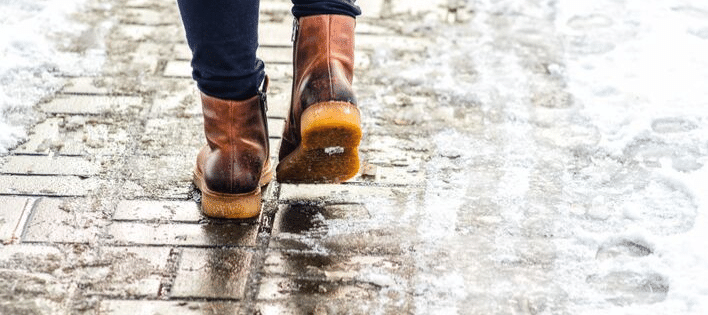Winter weather is quickly approaching and according to the Canadian Institute for Health Information, from 2016 to 2017, more than 8,000 Canadians were hospitalized due to falls on ice alone. Liability for icy sidewalk slip and fall injuries is not always clear and making a successful claim for damages is not always straightforward.
If you have suffered icy sidewalk slip and fall injuries, the “where,” “when,” and “why” are going to be critical factors in determining whether you should pursue legal action and what type of recovery you might receive.
Where Were You and How Was the Weather?
The law regarding icy sidewalk slip and fall injuries can change depending on the conditions that caused the fall and where it occurred. In general, those who are in control of property you enter must take reasonable steps to keep their property safe for its intended use.
If you are injured at your neighbor’s house, you must prove he or she was “negligent”—did not take reasonable steps to keep the property safe.
Similarly, if you trip over a broken piece of concrete on a city sidewalk in the middle of summer, you need to prove that the city did not take reasonable steps to keep the sidewalk safe for its intended use.
In the case of a slip and fall due to ice or snow, your case becomes harder to prove if it occurred on public property. Ontario’s Municipal Act establishes that the city is not liable for personal injury caused by snow or ice on a sidewalk unless “gross negligence” is shown.
In legal terms, gross negligence is a conscious or voluntary disregard of harmful consequences. Thus, if you have icy sidewalk slip and fall injuries, showing that the city’s failure to mitigate the icy conditions was unreasonable is not enough.
You must show that the city had a reckless disregard for its duty.
When Did the Accident Occur?
When the accident occurred can make or break a case, especially if it occurred on public property. Under the Ontario Limitations Act of 2002, the statute of limitations for a slip and fall injury is two years. If the injury occurred on public property, however, the Municipal Act imposes special rules that may bar your claim if you do not act immediately. Section 44(10) of the Municipal Act provides that slip and fall claims cannot be brought against a municipality unless written notice of the claim and injury are given to the municipality within 10 days of occurrence.
If this time period has passed, you may be able to argue that there was a “reasonable excuse” for the lack of notice. A judge will decide whether your case can proceed.
Why Did You Fall?
In order to succeed in an icy sidewalk slip and fall injuries case, simply proving you fell is not enough. Proving why you fell is key. For instance, if you fell on a city sidewalk in the middle of winter, the city will question what type of shoes you were wearing. If you were wearing three-inch heels or driving moccasins with no tread on the bottom, the city will be sure to argue that lack of appropriate footwear was the cause of the accident.
How a Lawyer Can Help
Icy sidewalk slip and fall injuries can range from relatively minor, such as muscle strains and bruises, to quite serious, such as broken bones and traumatic brain injuries.
Sometimes multiple actors may be at fault. Recovery can include medical bills, pain and suffering, and loss of income. Timely notice to municipalities and the preservation of evidence are critical.
An experienced personal injury lawyer knows how to prevent your claim from being barred and will gather the evidence you need to build your strongest case. Especially in cases of serious injury, where the long-term consequences may be uncertain, a consultation with a lawyer with expertise in this area is definitely worthwhile.















